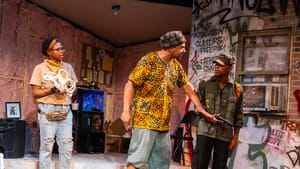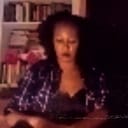Stay in the Loop
BSR publishes on a weekly schedule, with an email newsletter every Wednesday and Thursday morning. There’s no paywall, and subscribing is always free.
A mixed-media world premiere in Trenton
Passage Theatre Presents Richard Bradford and Anthony Martinez-Briggs’s Ghetto Gods in Divineland

Ghetto Gods in Divineland is a mixed-media choreo-play now getting its world premiere at Trenton’s Passage Theatre Company. In a story by playwrights Richard Bradford and Anthony Martinez-Briggs, we meet a brother and sister who reunite after their mother's death. They investigate their neighborhood’s increasing destabilization, catalyzed by a sinkhole and a Trenton bridge improvement project. While the academic sister Gekiyla (Tasha Holmes) investigates the sinkhole’s fauna, her brother Ameen (Davon Cochran) leads an Occupy Trenton bridge movement. The Ghetto Gods (Craig Storrod and Alicia Thomas) are the podcast/DJ team who narrate the events in an area of Trenton known as Divineland.
Echoes of Spike Lee and Ntozake Shange
The play features echoes of Spike Lee’s Do the Right Thing with the choreopoem creativity of Ntozake Shange’s For Colored Girls. At its strongest, the production experiments with fresh music, social poetry, and communal dance. I loved the semi-a cappella opening, the old-school breaking session complete with Adidas tracksuits, and the emotional dance breaks. Choreographer Sanchel Brown creates rough yet soulful movements. Director Ozzie Jones provides clean staging with multiple levels, embracing the entire theater space (a converted church), including the aisle and stage-floor apron.
Marie Laster’s set design includes four key locations that exist simultaneously: the Ghetto Gods’ DJ booth, the Trenton bridge above, earthbound Trenton buildings, and Gekiyla’s underground mines. The graffiti-strewn buildings look realistic while doubling as a backdrop for civil-rights projections. I loved how the five-person ensemble plays alternating characters. While the performers are young in their talents, Carlo Campbell’s easy, relaxed demeanor as family friend Pappi Shh stands out, as well as Thomas’s humorous newscaster caricature. Cochran truly hits his concluding monologue.
Dropped metaphors
Ghetto Gods is a play of many concepts, but its blatant metaphors are never clearly explained, like Gekiyla’s red ribbon, mentioned and then removed. The magical, musical Zion root is dropped by the end. There are great hints of Greek mythology with the Ghetto Gods’ DJ booth serving as a pseudo-Mount Olympus, but it’s not really called out. Instead, the play uses numerous overdone tropes and overdramatic actions. The cultural moments are great, but every time the show reverts to dialogue, the writing becomes one-dimensional. We don’t need the dead mother cliché to catalyze the play. We don’t need a romance shoehorned in, with Papi Shh suddenly telling Gekiyla he is “tired of waiting.” We don’t need another angry activist with a gun. I’m tired of white men writing that stereotype. We don’t need this idea penned by Black writers.

I understand why Passage Theatre fast-tracked this to the stage. The mixed media incorporating civil-rights footage is exciting, and the show is at its strongest when it experiments with poetry. But this presentation reminds me of a social-justice play I wrote in high school, full of concepts but lacking follow-through. Rather than creating a fictional incident and using TV tropes to fill the dialogue, I wish the makers had doubled down on the show’s more creative facets. How about a full choreopoem play recreating an actual event? In 2018, there was a mass shooting at an all-night art fair in Trenton. Assumedly, because the subjects were Black, it was overlooked in nationwide media.
What it means to be gifted, Black, and ignored
African Americans are ghetto gods: brilliant people who invented the three-light traffic signal and the gas mask (Garrett Morgan), the modern ironing board (Sarah Boone), and the home security system (Mary Van Brittan Brown), yet are still continuously overlooked and underestimated in modern-day society and pushed into areas with limited resources. Although Ameen’s final monologue hints at this, I feel there was no real examination of what it truly means to be gifted, Black, and ignored.
As an African American, writing a critical review of an African American play is sacrilege. I can honestly note that the performance I attended was extremely well-received. The overpacked audience LOVED it. A woman beside me said she cried. Egun Omode, the mostly female drumming troupe, was EXCELLENT. However, while the opening, the music, and the dancing excited me, the writers’ preference for shock value, soap opera-style dialogue, and comedy diluted the message.
What, When, Where
Ghetto Gods in Divineland. By Richard Bradford and Anthony Martinez-Briggs, directed by Ozzie Jones. Through February 25, 2024, at Mill Hill Playhouse, 205 E Front Street, Trenton. (609) 392-0766 or passagetheatre.org.
Accessibility
Mill Hill Playhouse is a wheelchair-accessible venue, with an entrance ramp and an ADA-compliant elevator.
Sign up for our newsletter
All of the week's new articles, all in one place. Sign up for the free weekly BSR newsletters, and don't miss a conversation.

 An Nichols
An Nichols